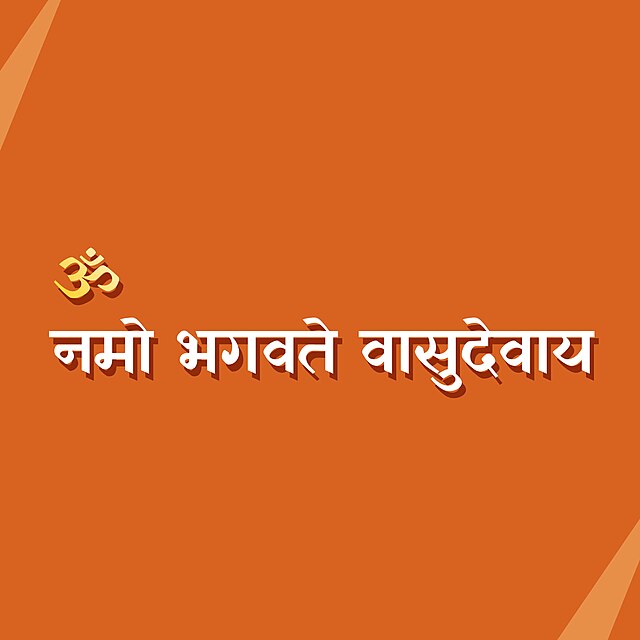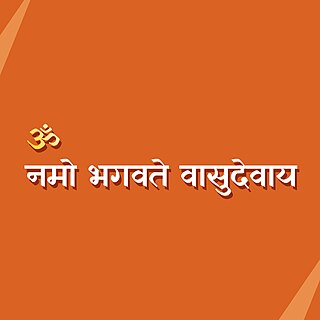Top Qs
Timeline
Chat
Perspective
Om Namo Bhagavate Vāsudevāya
A Hindu mantra From Wikipedia, the free encyclopedia
Remove ads
Om Namo Bhagavate Vāsudevāya (Sanskrit: ॐ नमो भगवते वासुदेवाय, lit. 'I bow to God Vāsudeva'; ⓘ) is one of the most popular mantras in Hinduism and, according to the Bhagavata tradition, the most important mantra in Vaishnavism.[1] It is called the Dvadasakshari Mantra,[2] or simply Dvadasakshari, meaning the "twelve-syllable" mantra, dedicated to Vishnu or Krishna.[3][4]

Remove ads
Origin
Bhagavatism, one of the traditions that was assimilated with what would become Vaishnavism, revered the Vrishni heroes, primary among them being Vāsudeva (Krishna).[5] It may be concluded that the mantra was first associated with the reverence of Vāsudeva as the supreme deity[6] before he was syncretised with Vishnu, after which it became an invocation of both deities.

Remove ads
Meaning
Om Namo Bhagavate Vasudevaya means "Om, I bow to Lord Vāsudeva or Lord Vishnu".[7]
Remove ads
Details
Om Namo Bhagavate Vāsudevaya means "prostration to Vasudeva", who is variously understood as Krishna.[9] The Vaishnava Upanishads state that this mantra is described on the Sudarshana Chakra:[10]
Similarly, in the twelve petals, is placed the Vasudevan (the twelve-syllabled Mantra, Om Namo Bhagavate Vasudevaya).
The Sharada Tilaka, a Tantric text, states:
"Dvadasharno mahamantrah pradhano Vaishnavagame"— The twelve lettered mantra is the chief among vaishnava mantras.
Similarly, this is referred to as the ultimate mantra in the Shrimad Bhagavatam. This twelve syllable mantra[11] is known as a mukti (liberation) mantra, and a spiritual formula for attaining freedom.[citation needed] The mantra can also be found in the Vishnu Purana.[12]
In the epic Mahabharata, Dhruva chanted this mantra in his penance as ordered by sage Narada.[13]
In popular culture
- Swami Vivekananda used this phrase multiple times in his lectures and letters.[14][15]
- Dayananda Saraswati wrote a book named "Om Namo Bhagavate Vasudevaya".[citation needed]
- Willow Smith and Jahnavi Harrison put this mantra into their song Gajendra from their collaborative album RISE.[citation needed]
See also
References
Wikiwand - on
Seamless Wikipedia browsing. On steroids.
Remove ads
